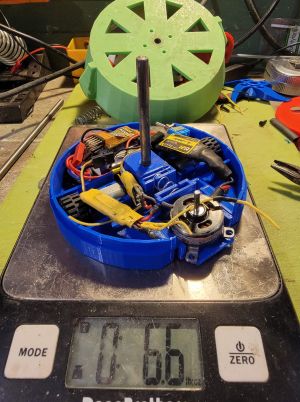Difference between revisions of "Plastic Antweights"
m |
m |
||
| Line 3: | Line 3: | ||
In 2015 [http://westernalliedrobotics.com Western Allied Robotics] introduced a new robot class called Plastic Antweights. The robot class has gained popularitity and the [http://sparc.tools/wordpress/wp-content/uploads/2019/SPARC_Robot_Construction_Specifications_v1.3.pdf rules] set has been adopted by [http://sparc.tools/ SPARC]. | In 2015 [http://westernalliedrobotics.com Western Allied Robotics] introduced a new robot class called Plastic Antweights. The robot class has gained popularitity and the [http://sparc.tools/wordpress/wp-content/uploads/2019/SPARC_Robot_Construction_Specifications_v1.3.pdf rules] set has been adopted by [http://sparc.tools/ SPARC]. | ||
<br> | <br> | ||
| + | |||
The spirit of the Plastic Antweight classe is to have an easy entry point for new builders and to encourage creative designs by limiting materials to plastics that are easy to work with, commonly used in [[3D_Printing|3D printers]] and don’t have strength characteristics common in the standard classes. These limitations not only make the class easy to build for, but have encouraged a lot of creative designs which may not have been tried in the full-combat antweight class. | The spirit of the Plastic Antweight classe is to have an easy entry point for new builders and to encourage creative designs by limiting materials to plastics that are easy to work with, commonly used in [[3D_Printing|3D printers]] and don’t have strength characteristics common in the standard classes. These limitations not only make the class easy to build for, but have encouraged a lot of creative designs which may not have been tried in the full-combat antweight class. | ||
<br> | <br> | ||
| + | |||
It is important to note that plenty of non-plastic materials can be used in parts of the robot class. Foam is allowed for wheels and internal shock absorbtion. Metal fasteners can be used as long as they don't act as armor or weapon impactors. | It is important to note that plenty of non-plastic materials can be used in parts of the robot class. Foam is allowed for wheels and internal shock absorbtion. Metal fasteners can be used as long as they don't act as armor or weapon impactors. | ||
| + | <br> | ||
| + | |||
| + | The [[3D Printing]] page lists numerous bot designs on Thingaverse that can be printed but most events do not require the robots to be printed. | ||
Revision as of 04:58, 20 October 2021
Plastic Antweights
In 2015 Western Allied Robotics introduced a new robot class called Plastic Antweights. The robot class has gained popularitity and the rules set has been adopted by SPARC.
The spirit of the Plastic Antweight classe is to have an easy entry point for new builders and to encourage creative designs by limiting materials to plastics that are easy to work with, commonly used in 3D printers and don’t have strength characteristics common in the standard classes. These limitations not only make the class easy to build for, but have encouraged a lot of creative designs which may not have been tried in the full-combat antweight class.
It is important to note that plenty of non-plastic materials can be used in parts of the robot class. Foam is allowed for wheels and internal shock absorbtion. Metal fasteners can be used as long as they don't act as armor or weapon impactors.
The 3D Printing page lists numerous bot designs on Thingaverse that can be printed but most events do not require the robots to be printed.
